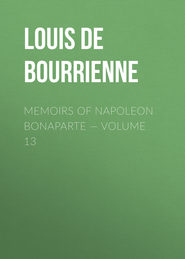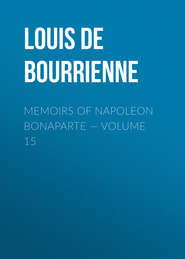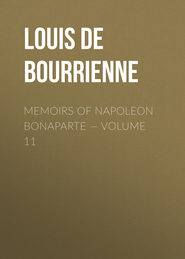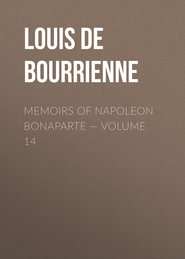По всем вопросам обращайтесь на: info@litportal.ru
(©) 2003-2024.
✖
Memoirs of Napoleon Bonaparte — Volume 03
Настройки чтения
Размер шрифта
Высота строк
Поля
Bonaparte composed the first Consular Ministry as follows: Berthier was Minister of War; Gaudin, formerly employed in the administration of the Post Office, was appointed Minister of Finance; Cambacérès remained Minister of Justice; Forfait was Minister of Marine; La Place of the Interior; Fouché of Police; and Reinhard of Foreign Affairs.
Reinhard and La Place were soon replaced, the former by the able M. Talleyrand, the latter by Lucien Bonaparte[51]. It may be said that Lucien merely passed through the Ministry on his way to a lucrative embassy in Spain. As to La Place, Bonaparte always entertained a high opinion of his talents. His appointment to the Ministry of the Interior was a compliment paid to science; but it was not long before the First Consul repented of his choice. La Place, so happily calculated for science, displayed the most inconceivable mediocrity in administration. He was incompetent to the most trifling matters; as if his mind, formed to embrace the system of the world, and to interpret the laws of Newton and Kepler, could not descend to the level of subjects of detail, or apply itself to the duties of the department with which he was entrusted for a short, but yet, with regard to him, too long a time.
[51]—[When I quitted the service of the First Consul Talleyrand was still at the head of the Foreign Department. I have frequently been present at this great statesman's conferences with Napoleon, and I can declare that I never saw him flatter his dreams of ambition; but, on the contrary, he always endeavoured to make him sensible of his true interests.—Bourrienne.]—
On the 26th Brumaire (17th November 1799) the Consuls issued a decree, in which they stated that, conformably with Article III. of the law of the 19th of the same month, which especially charged them with the reestablishment of public tranquillity, they decreed that thirty-eight individuals, who were named, should quit the continental territory of the Republic, and for that purpose should proceed to Rochefort, to be afterwards conducted to, and detained in, the department of French Guiana. They likewise decreed that twenty-three other individuals, who were named, should proceed to the commune of Rochelle, in the department of the lower Charente, in order to be afterwards filed and detained in such part of that department as should be pointed out by the Minister of General Police. I was fortunate enough to keep my friend M. Moreau de Worms, deputy from the Youne, out of the fiat of exiles. This produced a mischievous effect. It bore a character of wanton severity quite inconsistent with the assurances of mildness and moderation given at St. Cloud on the 19th Brumaire. Cambacérès afterwards made a report, in which he represented that it was unnecessary for the maintenance of tranquillity to subject the proscribed to banishment, considering it sufficient to place them under the supervision of the superior police. Upon receiving the report the Consuls issued a decree, in which they directed all the individuals included in the proscription to retire respectively into the different communes which should be fixed upon by the Minister of Justice, and to remain there until further orders.
At the period of the issuing of these decrees Sieyès was still one of the Consuls, conjointly with Bonaparte and Roger Ducos; and although Bonaparte had, from the first moment, possessed the whole power of the government, a sort of apparent equality was, nevertheless, observed amongst them. It was not until the 25th of December that Bonaparte assumed the title of First Consul, Cambacérès and Lebrun being then joined in the office with him. He had fixed his eyes on them previously to the 18th Brumaire, and he had no cause to reproach them with giving him much embarrassment in his rapid progress towards the imperial throne.
I have stated that I was so fortunate as to rescue M. Moreau de Worms from the list of proscription. Some days after Sieyès entered Bonaparte's cabinet and said to him, "Well, this M. Moreau de Worms, whom M. Bourrienne induced you to save from banishment, is acting very finely! I told you how it would be! I have received from Sens, his native place, a letter which informs me that Moreau is in that town, where he has assembled the people in the market-place, and indulged in the most violent declamations against the 18th Brumaire,"—"Can you rely upon your agent" asked Bonaparte.—"Perfectly. I can answer for the truth of his communication." Bonaparte showed me the bulletin of Sieyès' agent, and reproached me bitterly. "What would you say, General," I observed, "if I should present this same M. Moreau de Worms, who is declaiming at Sens against the 18th Brumaire, to you within an hour?"—"I defy you to do it."—"I have made myself responsible for him, and I know what I am about. He is violent in his politics; but he is a man of honour, incapable of failing in his word."—"Well, we shall see. Go and find him." I was very sure of doing what I had promised, for within an hour before I had seen M. Moreau de Worms. He had been concealed since the 19th Brumaire, and had not quitted Paris. Nothing was easier than to find him, and in three-quarters of an hour he was at the Luxembourg. I presented him to Bonaparte, who conversed with him a long time concerning the 18th Brumaire. When M. Moreau departed Bonaparte said to me, "You are right. That fool Sieyès is as inventive as a Cassandra. This proves that one should not be too ready to believe the reports of the wretches whom we are obliged to employ in the police." Afterwards he added, "Bourrienne, Moreau is a nice fellow: I am satisfied with him; I will do something for him." It was not long before M. Moreau experienced the effect of the Consul's good opinion. Some days after, whilst framing the council of prizes, he, at my mere suggestion, appointed M. Moreau one of the members, with a salary of 10,000 francs. On what extraordinary circumstances the fortunes of men frequently depend! As to Sieyès, in the intercourse, not very frequent certainly, which I had with him, he appeared to be far beneath the reputation which he then enjoyed[52]. He reposed a blind confidence in a multitude of agents, whom he sent into all parts of France. When it happened, on other occasions, that I proved to him, by evidence as sufficient as that in the case of M. Moreau, the falseness of the reports he had received, he replied, with a confidence truly ridiculous, "I can rely on my men." Sieyès had written in his countenance, "Give me money!" I recollect that I one day alluded to this expression in the anxious face of Sieyès to the First Consul. "You are right," observed he to me, smiling; "when money is in question, Sieyès is quite a matter-of-fact man. He sends his ideology to the right about and thus becomes easily manageable. He readily abandons his constitutional dreams for a good round sum, and that is very convenient[53]."
[52]—[M. de Talleyrand, who is so capable of estimating men, and whose admirable sayings well deserve to occupy a place in history, had long entertained a similar opinion of Sieyès. One day, when he was conversing with the Second Consul concerning Sieyès, Cambacérès said to him. "Sieyès, however, is a very profound man."—"Profound?" said Talleyrand. "Yes, he is, a cavity, a perfect cavity, as you would say."—Bourrienne.]—
[53]—[Everybody knows, in fact, that Sieyès refused to resign his consular dignities unless he received in exchange a beautiful farm situated in the park of Versailles, and worth about 15,000 livres a year. The good abbé consoled himself for no longer forming a third of the republican sovereignty by making himself at home in the ancient domain of the kings of France.—Bourrienne.]—
Bonaparte occupied, at the Little Luxembourg, the apartments on the ground floor which lie to the right on entering from the Rue de Vaugirard. His cabinet was close to a private staircase, which conducted me to the first floor, where Josephine dwelt. My apartment was above.
After breakfast, which was served at ten o'clock, Bonaparte would converse for a few moments with his usual guests, that is to say, his 'aides de camp', the persons he invited, and myself, who never left him. He was also visited very often by Deferment, Regnault (of the town of St. Jean d'Angély), Boulay (de la Meurthe), Monge, and Berber, who were, with his brothers, Joseph and Lucien, those whom he most delighted to see; he conversed familiarly with them. Cambacérès generally came at mid-day, and stayed some time with him, often a whole hour. Lebrun visited but seldom. Notwithstanding his elevation, his character remained unaltered; and Bonaparte considered him too moderate, because he always opposed his ambitious views and his plans to usurp power. When Bonaparte left the breakfast-table it was seldom that he did not add, after bidding Josephine and her daughter Hortense good-day, "Come, Bourrienne, come, let us to work."
After the morning audiences I stayed with Bonaparte all the day, either reading to him, or writing to his dictation. Three or four times in the week he would go to the Council. On his way to the hall of deliberation he was obliged to cross the courtyard of the Little Luxembourg and ascend the grand staircase. This always vexed him, and the more so as the weather was very bad at the time. This annoyance continued until the 25th of December, and it was with much satisfaction that he saw himself quit of it. After leaving the Council he used to enter his cabinet singing, and God knows how wretchedly he sung! He examined whatever work he had ordered to be done, signed documents, stretched himself in his arm-chair, and read the letters of the preceding day and the publications of the morning. When there was no Council he remained in his cabinet, conversed with me, always sang, and cut, according to custom, the arm of his chair, giving himself sometimes quite the air of a great boy. Then, all at once starting up, he would describe a plan for the erection of a monument, or dictate some of those extraordinary productions which astonished and dismayed the world. He often became again the same man, who, under the walls of St. Jean d'Acre, had dreamed of an empire worthy his ambition.
At five o'clock dinner was served up. When that was over the First Consul went upstairs to Josephine's apartments, where he commonly received the visits of the Ministers. He was always pleased to see among the number the Minister of Foreign Affairs, especially since the portfolio of that department had been entrusted to the hands of M. de Talleyrand. At midnight, and often sooner, he gave the signal for retiring by saying in a hasty manner, "Allons nous coucher."
It was at the Luxembourg, in the salons of which the adorable Josephine so well performed the honours, that the word 'Madame' came again into use. This first return towards the old French politeness was startling to some susceptible Republicans; but things were soon carried farther at the Tuileries by the introduction of 'Votre Altesse' on occasions of state ceremony, and Monseigneur in the family circle.
If, on the one hand, Bonaparte did not like the men of the Revolution, on the other he dreaded still more the partisans of the Bourbons. On the mere mention of the name of those princes he experienced a kind of inward alarm; and he often spoke of the necessity of raising a wall of brass between France and them. To this feeling, no doubt, must be attributed certain nominations, and the spirit of some recommendations contained in the notes with which he was supplied on the characters of candidates, and which for ready reference were arranged alphabetically. Some of the notes just mentioned were in the handwriting of Regnault de St. Jean d'Angély, and some in Lucien Bonaparte's[54].
[54]—[Among them was the following, under the title of "General Observations": "In choosing among the men who were members of the Constituent Assembly it is necessary to be on guard against the Orleans' party, which is not altogether a chimera, and may one day or other prove dangerous.
"There is no doubt that the partisans of that family are intriguing secretly; and among many other proofs of this fact the following is a striking one: the journal called the 'Aristargue', which undisguisedly supports royalism, is conducted by a man of the name of Voidel, one of the hottest patriots of the Revolution. He was for several months president of the committee of inquiry which caused the Marquis de Favras to be arrested and hanged, and gave so much uneasiness to the Court. There was no one in the Constituent Assembly more hateful to the Court than Voidel, so much on account of his violence as for his connection with the Duke of Orleans, whose advocate and counsel he was. When the Duke of Orleans was arrested, Voidel, braving the fury of the revolutionary tribunals, had the courage to defend him, and placarded all the walls of Paris with an apology for the Duke and his two sons. This man, writing now in favour of royalism, can have no other object than to advance a member of the Orleans family to the throne."—Bourrienne.]—
At the commencement of the First Consul's administration, though he always consulted the notes he had collected, he yet received with attention the recommendations of persons with whom he was well acquainted; but it was not safe for them to recommend a rogue or a fool. The men whom he most disliked were those whom he called babblers, who are continually prating of everything and on everything. He often said,— "I want more head and less tongue." What he thought of the regicides will be seen farther on, but at first the more a man had given a gage to the Revolution, the more he considered him as offering a guarantee against the return of the former order of things. Besides, Bonaparte was not the man to attend to any consideration when once his policy was concerned.
As I have said a few pages back, on taking the government into his own hands Bonaparte knew so little of the Revolution and of the men engaged in civil employments that it was indispensably necessary for him to collect information from every quarter respecting men and things. But when the conflicting passions of the moment became more calm and the spirit of party more prudent, and when order had been, by his severe investigations, introduced where hitherto unbridled confusion had reigned, he became gradually more scrupulous in granting places, whether arising from newly-created offices, or from those changes which the different departments often experienced. He then said to me, "Bourrienne, I give up your department to you. Name whom you please for the appointments; but remember you must be responsible to me."
What a list would have been which should contain the names of all the prefects, sub-prefects, receivers-general, and other civil officers to whom I gave places! I have kept no memoranda of their names; and indeed, what advantage would there have been in doing so? It was impossible for me to have a personal knowledge of all the fortunate candidates; but I relied on recommendations in which I had confidence.
I have little to complain of in those I obliged; though it is true that, since my separation from Bonaparte, I have seen many of them take the opposite side of the street in which I was walking, and by that delicate attention save me the trouble of raising my hat.











